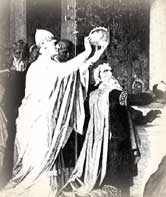
Paschal the Primicerius, a nephew of Pope Adrian I was a sore loser.
He wanted to be pope, but in 795, Leo was installed instead. With his
cronies, Paschal plotted a cruel revenge.
On this
day, April 25, 799, as Leo walked in the procession of the
Greater Litanies (a form of chanted prayer and responses on St. Mark's
Day), armed men attacked him.
They scattered the procession and set upon Leo, stabbing his eyes and
attempting to cut out his tongue. Leo fell bleeding in the street. The
ruffians then dragged him to the chapel of St. Sylvester and jabbed at
his eyes again. Finally they left him in the monastery of Erasmus.
Miraculously, Leo recovered sight and the use of his tongue. Friends
helped him escape from the monastery and eventually he worked his way
over the Alps to the court of Charlemagne. The King of the Franks
received Leo sympathetically and returned him to Rome under the
protection of his own officials. The Romans cheered.
Paschal's men leveled wild accusations at Leo. Leo asked the bishops
to try him. They refused, and so he swore in St. Peters that he was
innocent of the charges. Charlemagne ordered the conspirators executed,
but Leo, remembering Christ's command to forgive our enemies, pleaded
for their lives. In the end, they were merely exiled.
While Charlemagne lived, he and Leo maintained a close working
relationship, probably the best ever between the Franks and the popes.
The following Christmas Day, as Charlemagne knelt in St. Peter's, Leo
placed a jeweled crown on his head. The assembly shouted: "To Charles,
the most pious Augustus, crowned by God, to our great and pacific
emperor life and victory!"
By crowning Charlemagne, Leo was in effect claiming that emperors
receive their authority from the church, a proposition which would be
sorely tested in coming centuries. However, Charlemagne protected Leo,
and the two worked together to maintain the peace of Italy and, indeed,
to some extent of the entire Mediterranean world. Charlemagne also gave
Leo rich treasures from his conquests, with which the pope beautified
Rome and assisted the poor.
After Charlemagne died, Leo's enemies resurfaced. Again they plotted
against him. This time Leo found out about it early enough to arrest the
conspirators before they could attack.
Had the years hardened Leo? This time there was no leniency: he had
them executed.
Bibliography:
- Brusher, Joseph Stanislaus. Popes through the Ages.
Princeton, N. J.: Van Nostrand, 1959.
- De Rosa, Peter. Vicars of Christ; the dark side of the papacy.
Dublin: Poolbeg Press, 2000, pp. 45-46.
- Durant, Will. The Age of Faith. Part IV of the Story of
Civilization. New York: Simon and Schuster, 1950, especially pp.
468-469.
- Lea, Henry C. Studies in Church History. Philadelphia:
Henry C. Lea; London: Samson, Low, Son, & Marston, 1869, pp.34,35.
- "Leo III, St." The Oxford Dictionary of the Christian
Church. Edited by F. L. Cross and E. A. Livingstone. Oxford,
1997.
- Mann, Horace K. "Pope St. Leo III." The Catholic
Encyclopedia. New York: Robert Appleton, 1914.
- Montor, Chevalier Artaud de. Lives and Times of the Popes.
New York: Catholic Publication Society of America, 1909.
- Various encyclopedia and internet articles.
Read this article at - http://www.christianity.com/church/church-history/timeline/601-900/leo-iii-attacked-in-a-procession-11629757.html

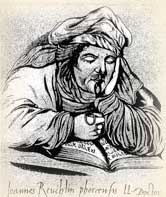 To Johann Reuchlin, Luther owed the Hebrew grammar for his Bible
translation. A man of lowly birth, Reuchlin's talent for singing brought
him to the attention of the Margrave of Baden who made him a companion
of his son. In love with learning, the singer seized every opportunity
his new position afforded to educate himself. Languages were his forte.
He wrote the first Latin dictionary to be published in Germany and a
Greek grammar. Hebrew was his dearest love. He ferreted out the rules of
Israel's ancient language by study of Hebrew texts and converse with
every rabbi who appeared within his range. His authority became widely
recognized.
To Johann Reuchlin, Luther owed the Hebrew grammar for his Bible
translation. A man of lowly birth, Reuchlin's talent for singing brought
him to the attention of the Margrave of Baden who made him a companion
of his son. In love with learning, the singer seized every opportunity
his new position afforded to educate himself. Languages were his forte.
He wrote the first Latin dictionary to be published in Germany and a
Greek grammar. Hebrew was his dearest love. He ferreted out the rules of
Israel's ancient language by study of Hebrew texts and converse with
every rabbi who appeared within his range. His authority became widely
recognized. Paschal the Primicerius, a nephew of Pope Adrian I was a sore loser.
He wanted to be pope, but in 795, Leo was installed instead. With his
cronies, Paschal plotted a cruel revenge.
Paschal the Primicerius, a nephew of Pope Adrian I was a sore loser.
He wanted to be pope, but in 795, Leo was installed instead. With his
cronies, Paschal plotted a cruel revenge. 
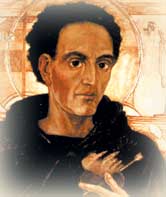 And we were baptized and all anxiety for our past life vanished
away." With these joyous words Augustine recorded his entrance into
the church
And we were baptized and all anxiety for our past life vanished
away." With these joyous words Augustine recorded his entrance into
the church 
 To be or not to be -- that is the question."
To be or not to be -- that is the question."
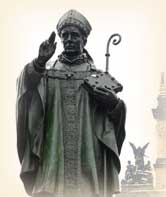 The first known missionary to the Prussians was Bishop Adalbert of
Prague. His work in Prussia followed years of fruitless labor in his
native Bohemia. Paradoxically, it was only by leaving his own people
that he won them.
The first known missionary to the Prussians was Bishop Adalbert of
Prague. His work in Prussia followed years of fruitless labor in his
native Bohemia. Paradoxically, it was only by leaving his own people
that he won them.
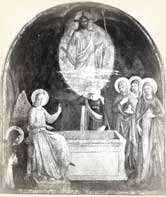 Many scholars believe that Christ died and rose from the dead again in
AD 30 (see our April 7 story). Even more prefer a date in AD 33,
although champions of several other dates can also be found. If the
events recorded in the gospels took place in AD 33, then
Many scholars believe that Christ died and rose from the dead again in
AD 30 (see our April 7 story). Even more prefer a date in AD 33,
although champions of several other dates can also be found. If the
events recorded in the gospels took place in AD 33, then